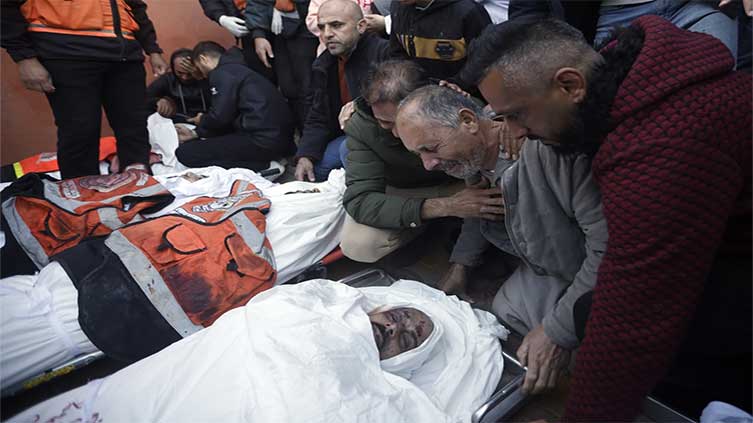4 patients die as oxygen runs out in Gaza hospital seized by Israeli forces, health officials say

World
4 patients die as oxygen runs out in Gaza hospital seized by Israeli forces, health officials say
RAFAH, Gaza Strip (AP) — The storming by Israeli troops of southern Gaza’s main hospital brought chaos to hundreds of staff and patients inside, as health officials Friday said four people in intensive care died after their oxygen cut off. Troops were searching the facility, where the military said it believes the remains of hostages abducted by Hamas might be located.
The raid came after troops had besieged Nasser Hospital in the southern city of Khan Younis for nearly a week, with staff, patients and others inside struggling under heavy fire and dwindling supplies, including food and water. Hours before troops seized the hospital Thursday, Israeli fire killed a patient and wounded six others inside the complex, staff said.
Negotiations over a cease-fire in Gaza, meanwhile, appear to have stalled, and Israeli Prime Minister Benjamin Netanyahu on Friday pushed back hard against the U.S. vision for after the war — particularly its calls for the creation of a Palestinian state. After speaking overnight with President Joe Biden, Netanyahu wrote on X that Israel will not accept “international dictates regarding a permanent settlement with the Palestinians.”
He said that if other countries unilaterally recognize a Palestinian state, it would give a “reward to terrorism.” Netanyahu has repeatedly rejected creation of a Palestinian state.
Netanyahu has vowed to continue the offensive and expand it to the Gaza city of Rafah, near Egypt, until Hamas is destroyed and scores of hostages taken during the militants’ Oct. 7 attack are freed. In their phone call, Biden again cautioned Netanyahu against moving forward with a military operation in Rafah before coming up with a “credible and executable plan” to ensure the safety of Palestinian civilians, the White House said.
With the war showing no sign of ending, the risk of a broader conflict grew as Israel and Lebanon’s Hezbollah militant group had deadliest exchange of fire along the border since the start of the Israel-Hamas war. Israel launched airstrikes into southern Lebanon for a second day on Thursday after killing 10 civilians and three Hezbollah fighters on Wednesday in response to a rocket attack that killed an Israeli soldier and wounded several others.
SCENES OF PANIC IN HOSPITAL
Nasser Hospital was the latest in a series of hospitals Israeli forces have besieged and stormed during the war, claiming Hamas was using them for military purposes. The assaults have gutted Gaza’s health sector as it struggles to treat a constant stream of people wounded in daily bombardments.
Israeli troops, tanks and snipers have surrounded Nasser Hospital for at least a week, with food, water and supplies inside dwindling and fire from outside killing several people inside, according to health officials.
Troops moved into the hospital Thursday after the military said it had “credible intelligence” that Hamas had held hostages there and that the hostages’ remains might still be inside. Rear Adm. Daniel Hagari, the chief military spokesperson, said forces were conducting a “precise and limited” operation there and would not forcibly evacuate medics or patients.
Later Thursday, Hagari said troops were still searching the hospital. He said dozens of militants were arrested from the hospital grounds, including three who participated in the Oct. 7 attack. He also said troops found grenades and mortar shells, and that Israeli radar determined that militants fired mortars from the hospital grounds a month ago. The claims could not be independently confirmed.
A released hostage told The Associated Press last month that she and over two dozen other captives had been held in Nasser Hospital.
International law prohibits the targeting of medical facilities, though they can lose those protections if they are used for military purposes. Even then, Israel must take precautions and follow principles of proportionality, the U.N. Human Rights Office said, adding that “as the occupying power” Israel has the duty to maintain medical facilities.


